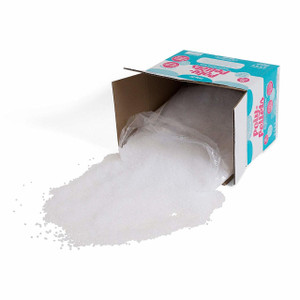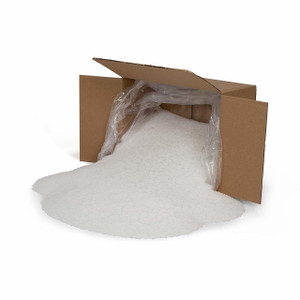
Poly Pellets 6 lb Pour and Store Bag
FairfieldBuy this Poly Pellets 6 lb Pour and Store Bag for your small weighted blanket projects and we will ship it to your home or office.
This Poly Pellets bag contains 6 lbs of weighted polypropylene plastic pellets.
Poly Pellets 6-lb Bag Features:
- Non-toxic, 100% polypropylene
- Safe for use in children's weighted blankets
- Washable polypropylene plastic pellets
- White, translucent pellets
- Close-able spout
- Small oval pellets
- Made in the USA
Polypropylene plastic pellets have a higher melting point than other plastic pellets
Perfectly isotactic PP has a melting point of 171 °C (340 °F). Commercial isotactic PP has a melting point that ranges from 160 to 166 °C (320 to 331 °F), depending on atactic material and crystallinity.
https://en.wikipedia.org/wiki/Polypropylene
Mechanical properties
The density of (PP) is between 0.895 and 0.92 g/cm³. Therefore, PP is the commodity plastic with the lowest density. With lower density, moldings parts with lower weight and more parts of a certain mass of plastic can be produced. Unlike polyethylene, crystalline and amorphous regions differ only slightly in their density. However, the density of polyethylene can significantly change with fillers.[6]:24
The Young's modulus of PP is between 1300 and 1800 N/mm².
Polypropylene is normally tough and flexible, especially when copolymerized with ethylene. This allows polypropylene to be used as an engineering plastic, competing with materials such as acrylonitrile butadiene styrene (ABS). Polypropylene is reasonably economical.[citation needed]
Polypropylene has good resistance to fatigue.[8]:3070
Thermal properties
The melting point of polypropylene occurs in a range, so the melting point is determined by finding the highest temperature of a differential scanning calorimetry chart. Perfectly isotactic PP has a melting point of 171 °C (340 °F). Commercial isotactic PP has a melting point that ranges from 160 to 166 °C (320 to 331 °F), depending on atactic material and crystallinity. Syndiotactic PP with a crystallinity of 30% has a melting point of 130 °C (266 °F).[8] Below 0 °C, PP becomes brittle.[9]
The thermal expansion of polypropylene is very large, but somewhat less than that of polyethylene.[9]






